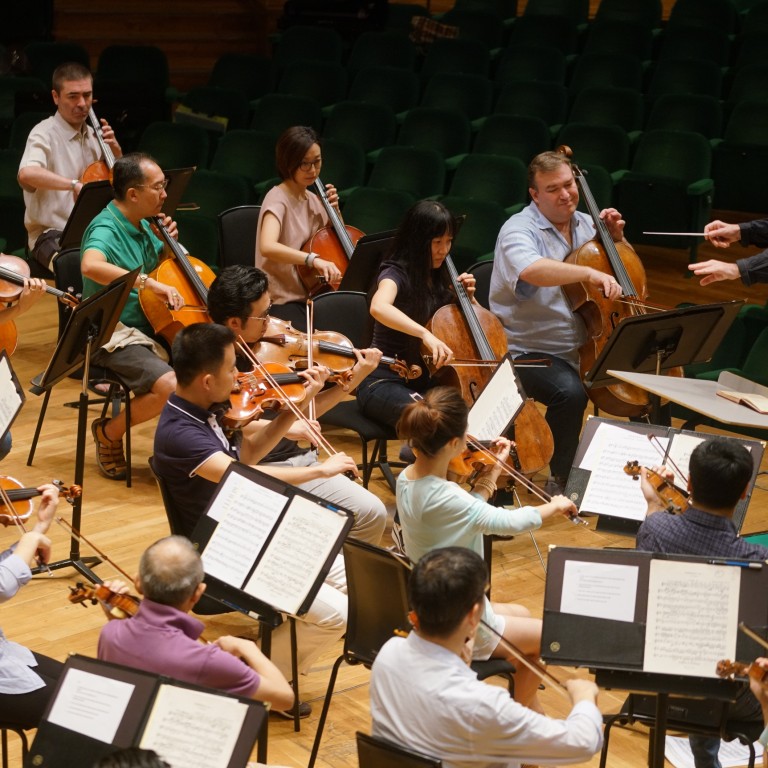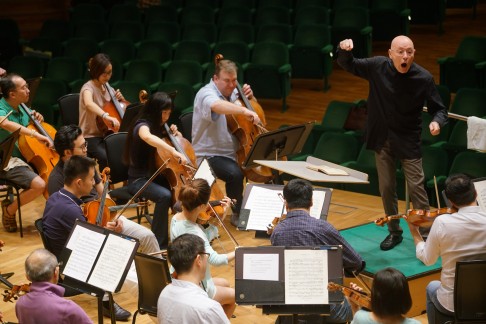
Conductor Christoph Eschenbach on his inspirations, and how good Hong Kong Phil is, ahead of concert
Gershwin, Dvorak and Brahms on the bill at the Hong Kong Cultural Centre
This weekend international conductor Christoph Eschenbach will make his debut with the Hong Kong Philharmonic Orchestra in what promises to be a high point of the ensemble’s season.
The programme includes Tzimon Barto as soloist in Gershwin’s Piano Concerto in F, and also Dvorak’s Carnival Overture and Brahms’ Symphony No 1.
Fresh from a four-week Asian tour with the Vienna Philharmonic, Eschenbach was full of praise for the Hong Kong players.
“The orchestra was so receptive, and technically was so good, that it was easy to get my ‘stamp’ on it,” says the youthful 75-year-old, whose conducting style is from the deep tradition of middle Europe but with a spontaneous spirit.
His conducting has sometimes been controversial, garnering comments about unpredictable tempos and disorganised rehearsals. However, in rehearsal with the Hong Kong Philharmonic for the Gershwin concerto this week, there was no hint of that. The tempos were taut and alive and the trumpet and flute solos had a relaxed flair.
The orchestra was so receptive, and technically was so good, that it was easy to get my ‘stamp’ on it
“At the beginning of the slow movement, which is particularly jazzy, I told the clarinets and trumpets especially to play it very smoky, very dark, kind of like a New Orleans jazz bar.”
The rich, almost Brahmsian texture and sheen was a revelation, making the case that Gershwin was not a classical wannabe, but the real thing.
American pianist Barto made the sometimes recalcitrant concert-hall piano come alive. He is a bodybuilder with an unusual silhouette for a concert pianist – his huge back muscles rippled through his T-shirt, and he sounded equally convincing with percussive syncopations as well as in moments of crystalline delicacy.

Perhaps one of the keys to Eschenbach’s intense musicality is that his early life was laced with tragedy.
He was orphaned, his mother died when he was born and his father fell victim to the Nazis.
“I had a very difficult childhood. I’m a child of the second world war. I was a refugee from Silesia [in 1946] and therefore I can understand the problems of the refugee movement now,” Eschenbach recalls.
“It was a very difficult journey, full of illnesses and death, right, left and in front of me. I was leftover, the only survivor in a camp of refugees, because there was a typhus epidemic. A cousin of my mother heard that I was there so she rescued me. I was so full of terrible impressions of that time that I was mute.”
He says it was fortunate that his mother’s cousin was a musician, and he was able to hear her playing the piano and singing when he was “very sick for months and months”.
“And something happened in me – all these bad impressions longed for a way out, and the music was a way of expression. And so when I was gaining health, I wanted to play the piano. She asked me [if I wanted to play] and I said, ‘Yes, yes!’”
I was a refugee from Silesia [in 1946] and therefore I can understand the problems of the refugee movement now
Although he always planned to become a conductor, a career playing the piano came first. After completing studies in piano, violin and conducting, “I won some piano competitions, the German Radio Competition and the Clara Haskil Competition, and that propelled me into an international career.
“I didn’t want to go through the mill of the opera house [to train as a conductor]. Although I love opera, I didn’t want to ruin my piano technique playing the Barber of Seville to Tristan to Wozzeck.”
He used the years of touring as a pianist as a hands-on conducting tutorial.
“I played with practically everybody. The wonderful ones and the not-so-good ones – also from the not-so-good ones you can learn. But nevertheless two of them became my mentors: George Szell from Cleveland who invited me to my American piano debut. The other was Herbert von Karajan. These two launched me into a conducting career.”
Eschenbach has been the music director of American orchestras since 1988, and his tenure with the National Symphony Orchestra in Washington, DC ends in 2017.
Perhaps a bit of the rebellious streak comes through: “I didn’t want the burden of the American orchestras’ ‘side-works’ – the fundraising and the unions and the boards. It’s for the music but it’s not music. I wanted to be free.”
Christoph Eschenbach with the HK Phil, Cultural Centre Concert Hall, October 23 and 24, 8pm. HK$280 to HK$780 Urbtix
